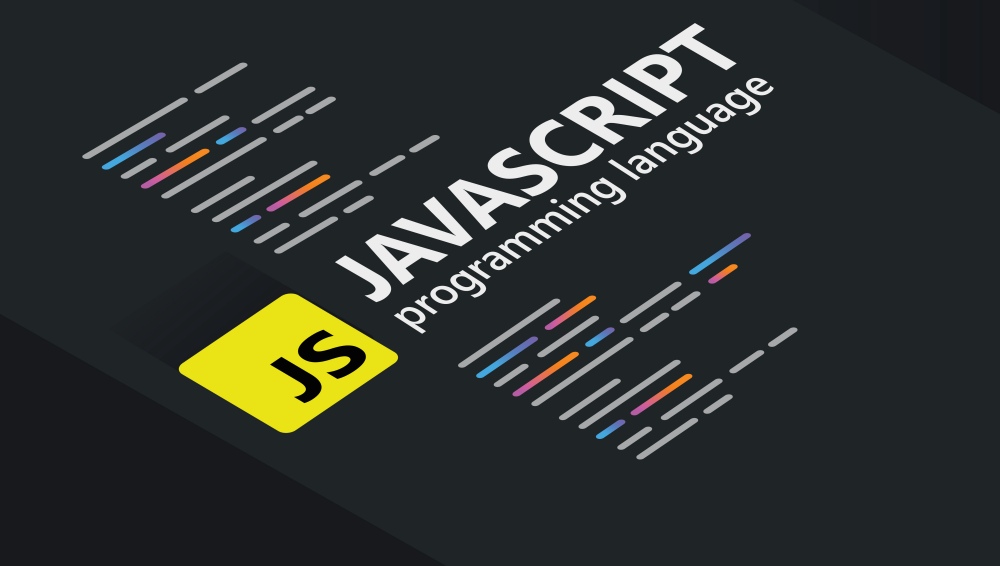The landscape of web development is revolutionizing with the growing technological advancements that are bringing ease to the process. JavaScript frameworks are also considered one of the revolutionizations that build engaging apps/websites with minimum coding efforts. Therefore, this guide will shed light on the types of JavaScript frameworks, their basic definitions, and a list of frameworks. If you need a framework with worldwide popularity so you don’t face troubles, give it a read and delve below.
What is A JavaScript Framework?
A JavaScript framework is a pre-written collection of JavaScript code that provides developers with a structured way to build web applications.
Instead of coding everything from scratch, developers use frameworks to handle common features like routing, state management, UI rendering, and data flow—making development faster and more efficient.
Popular JavaScript frameworks include React, Vue.js, Angular, and Svelte. Each offers different approaches, but all aim to simplify complex front-end or full-stack development tasks.
What Do You Know About JavaScript Framework?
Frameworks are pre-built structures designed to help developers create a web application effortlessly. Meanwhile, JavaScript is a powerful coding or programming language for front-end and back-end development. JavaScript frameworks refer to JavaScript code libraries, which provide pre-written codes to developers for routine programming tasks.
Instead of coding from scratch for repetitive tasks, developers use blueprints with shared libraries, tools, reference documents, and other resources. JavaScript frameworks offer component-based architecture, routing capabilities, and virtual DOM technologies to enhance developer productivity.
3 Basic Types of JavaScript Frameworks You Must Know
JavaScript frameworks provide pre-built libraries of codes to develop complex web applications effortlessly. There are several types of JavaScript Frameworks, each catering to different development needs and preferences. Thus, you might go through to understand their capabilities as discussed below:
1. Full-Featured Frameworks
This JavaScript framework is like an all-in-one toolkit for web development. It offers a comprehensive set of features that streamline the development of large-scale web applications. Additionally, using this type of framework enforces coding conventions and provides pre-built components, which results in getting more maintainable codes.
2. Micro-Frameworks
Micro-frameworks focus on flexibility, making them ideal for smaller projects where performance is important. Moreover, this framework is suitable for building APIs and prototypes where a full-stack framework doesn’t work well. It focuses on providing minimal core functionalities like handling HTTP requests or maintaining webpage structures.
3. Components Library
These JavaScript frameworks provide pre-built UI elements such as buttons, forms, navigation bars, etc. Instead of building codes for each element, you can utilize these libraries to develop complex interfaces without troubling your brain. With this, developers can focus on core logic while using pre-tested and visually appealing UI components.
A Clear Difference Between a JavaScript Library vs Framework
A JavaScript library is a collection of primary functions that can be added to applications or websites to perform certain actions. Meanwhile, JavaScript frameworks are generic and work as foundations defining web application designs.
In simple words, JavaScript libraries are pieces of furniture that add functionality to a constructed house, whereas frameworks are the house’s skeleton. If you are still uncertain about the difference, read the table below, which shows the JavaScript library vs. framework comparison.
| Metrics | JavaScript Frameworks | JavaScript Libraries |
|---|---|---|
| Flexibility | They impose specific structures, so they prove less flexible. | They can be integrated into different frameworks, so they are more flexible. |
| Inversion of Control | Dictates and shows how the applications must be built or designed. | Doesn’t dictate structures and provides building blocks for applications. |
| Scope of Functionality | Frameworks are designed to build complete applications with various tools and libraries, making them more functional. | Libraries are focused on specific tasks, so they are narrow regarding functionality. |
| Ease of Use | With less specific structure or code patterns, frameworks are easier to use. | With a larger ecosystem and guides, some libraries are also easy to access, among other resources. |
The 10 Most Popular JavaScript Frameworks
If you are new to web programming, the above discussion has guided you enough about JavaScript frameworks and clarified your basic concepts. Now, let’s focus on the main topic and discover the top JavaScript frameworks so you can pick one that aligns with your project.
1. React
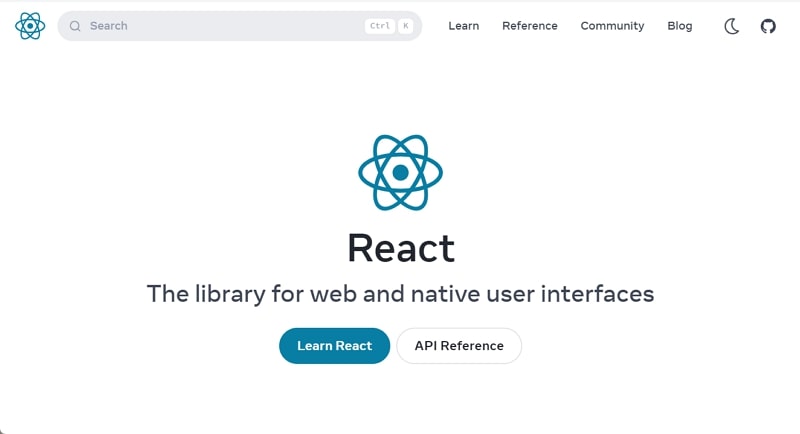
Among JavaScript frameworks, React is considered one of the best frameworks backed by Facebook in the front-end category frameworks that can build interactive and dynamic user interfaces. It also counts as a declarative JavaScript library, which focuses on building reusable components for complex web applications. Additionally, it delivers rendering via virtual DOM that renders changed components instead of while pages.
Pros
- This framework offers a compatible W3C object model even system that leverages cross-browser interface.
- It has several reusable components and an extensive ecosystem, so developers can get support when facing issues.
Con
- Users report a steep learning curve due to its JSX abilities and state management, which isn’t easy for beginners.
2. Next.js
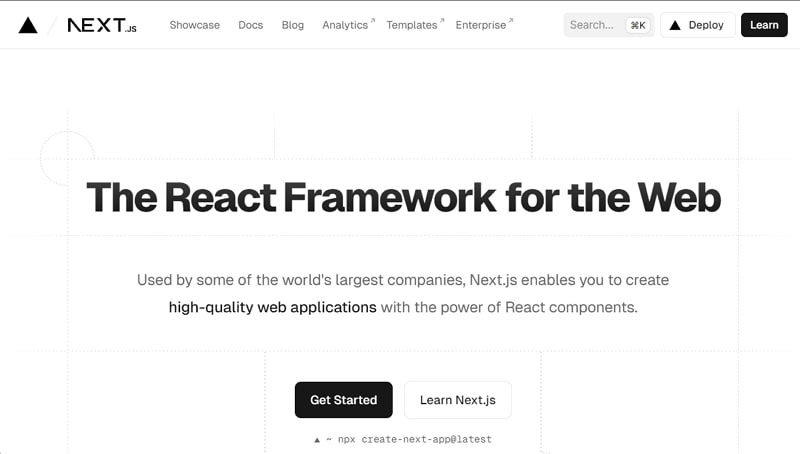
It’s a popular JavaScript framework that aims to build dynamic websites with user-friendly interfaces by using React and JavaScript components. Moreover, this framework, with its SSG and SSR capabilities, ensures that your web applications are SEO-optimized for all search engines. It also contains built-in support for internationalized routing and language detection and TypeScript support for enhancing code quality.
Pros
- It facilitates server-side rendering, which is great for the initial page loading and SEO.
- This framework provides out-of-the-box configuration, automatic code splitting, and image optimizations.
Con
- For simple projects, it includes more codes that aren’t needed, and it limits custom configurations.
You may also like: Next.js vs React: What are the Differences?
3. Vue.js
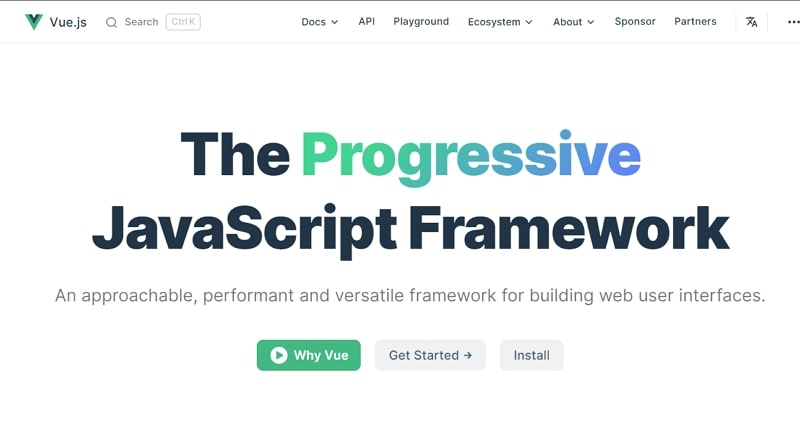
If you are looking to build a highly adaptable user interface or single-page application, you should try this JavaScript framework. It is primarily a front-end framework with data binding and reactive components to manage the application state. Besides, its ecosystem includes Vue CLI for project scaffolding, Pinia for state management. and Vue Router for routing.
Pros
- This framework facilitates the manipulation of values to HTML attributes and several methods to apply transitions to HTML elements.
- Also, it provides HTML-based templates that comply with the Virtual DOM Render function.
Con
- Notably, this JavaScript is not backed by big tech giants, making it less popular, and it only has 360+ contributors on GitHub.
4. Angular
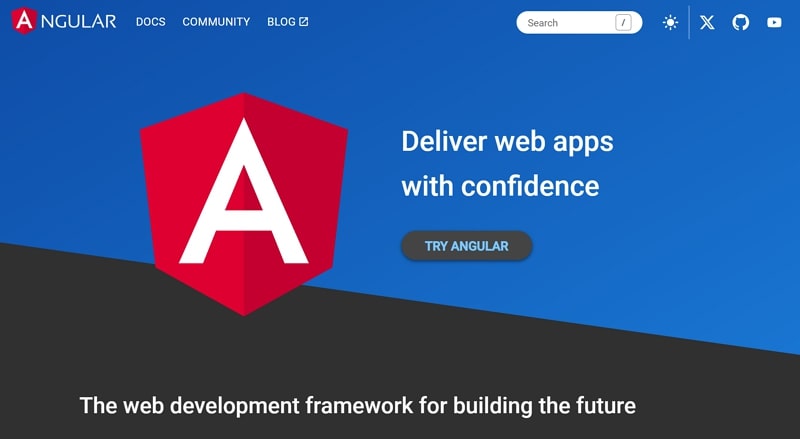
In the JavaScript frameworks list, Angular is a well-known choice of developers for web app development. This open-source framework aims to develop large-scale, high-performance enterprise-level applications with two-way binding abilities. Furthermore, it contains a modular development structure, routing, forms, handling, and dependency injection features to elevate productivity.
Pros
- Due to the advanced Component Router, web apps created with Angular will load more quickly than other applications.
- In addition, the foundation of this JavaScript framework is MVVM architecture, which makes the apps super responsive and fast.
Con
- This JavaScript framework is pretty large-sized, roughly around 550-600kb, which is why it is not suitable for small-scale web applications.
You may also like: Angular vs jQuery – Difference Between Angular and jQuery
5. Ember.js
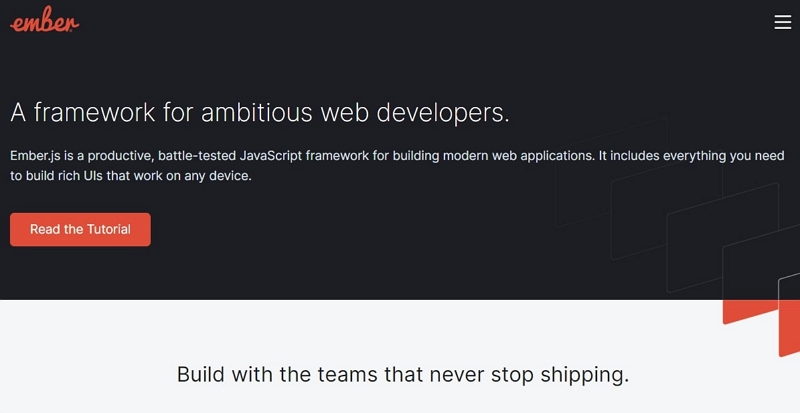
For modern web applications, the best JavaScript framework is Ember.js, which can build scalable web applications. It uses Handlebar to create dynamic HTML templates while relying on the jQuery libraries and MVC framework. Also, it offers instance initializers, reusable JavaScript web apps, routes as core features, and Ember CLI.
Pros
- Ember.js is suitable for URL support, debugging tools, easy documentation, and complex front-end apps.
- This best JavaScript framework offers convenience over configuration and routing systems with tight integration to browsers’ URLs.
Con
- It is a highly opinionated framework, which means any deviation from the standard can cause trouble.
6. Express
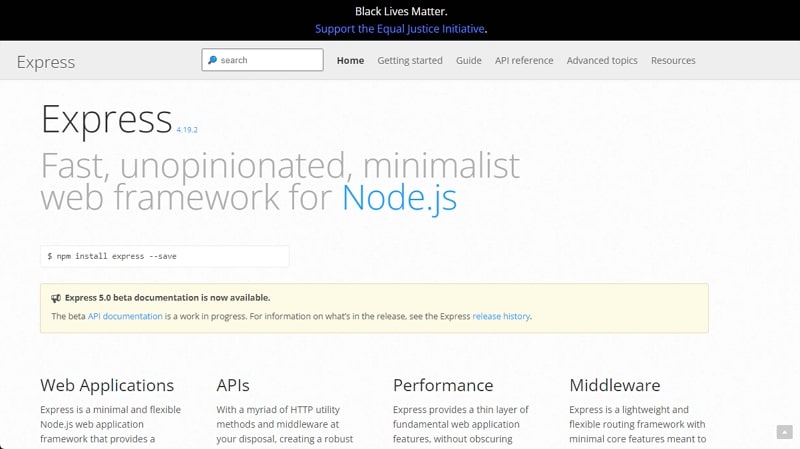
Compared with Ember.js, this JavaScript framework is an unopinionated and minimalist web app framework with robust features. It is the best back-end framework for Node.js because of its server-side coding, and it is also part of MEAN or MERN stacks. In addition, it offers a routing mechanism for dealing with dynamic URLs compared to the basic one of Node.js.
Pros
- Express is a series of middleware function calls that perform tasks like executing codes and ending the request-response cycle.
- Moreover, popular templates like HAML, Pug, and EJS work exceptionally with this JavaScript framework.
Con
- It doesn’t offer any security solutions, leaving the web application’s security to the developer and the quality of the code.
7. Svelte
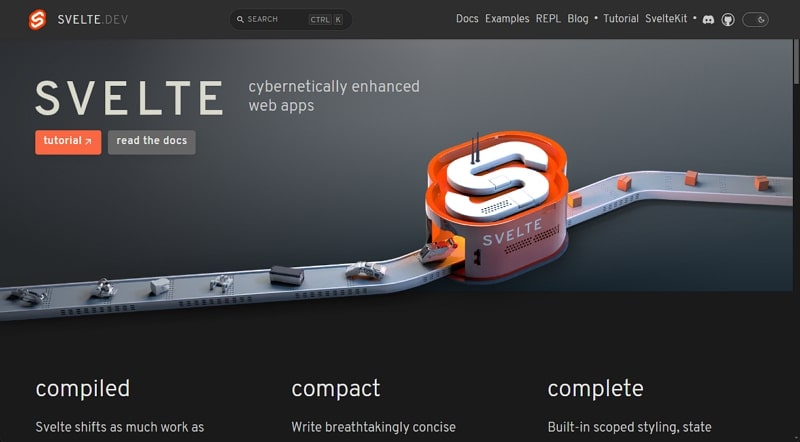
Svelte is a new JavaScript framework that can create reactive web applications with direct DOM manipulations and less boilerplate. Despite that, it automatically updates the DOM while offering a built-in module bundler for server-side rendering and static site generation. This JS framework cuts the need for external state management libraries and works exceptionally with preprocessors.
Pros
- It can write concise components using standard programming languages such as CSS, HTML, and JavaScript.
- Furthermore, it contains built-in scoped styling, motion primitives, state management, and form binding.
Con
- Reportedly, this framework has immature tooling for debugging applications and offers less community support.
8. Node.js
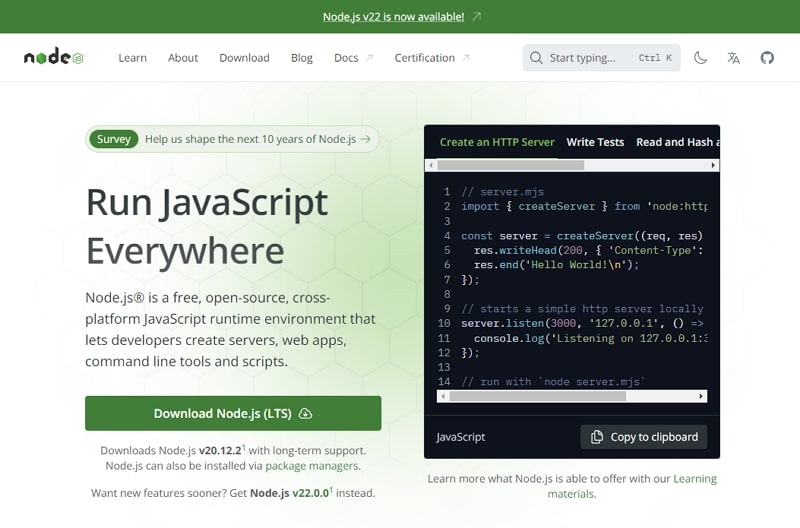
To develop server-side applications, Node.js is a cross-compatible and open-source server platform that uses a JavaScript back-end runtime environment. It can build scalable network applications and is known for event-driven architecture and non-blocking, efficient with data-intensive apps running across distributed devices. With the help of Node.js, you can also significantly decrease the loading time of your app using its Quick Caching feature.
Pros
- In addition to scalability, this JavaScript framework comes with fast code execution due to Google’s V8 JavaScript engine.
- This JavaScript framework helps you improve the response time of your web applications while allowing you to add advanced and powerful features.
Con
- It has an asynchronous programming model that might lead to nested callbacks and shows inconsistencies when maintaining NPM packages.
9. Backbone.js
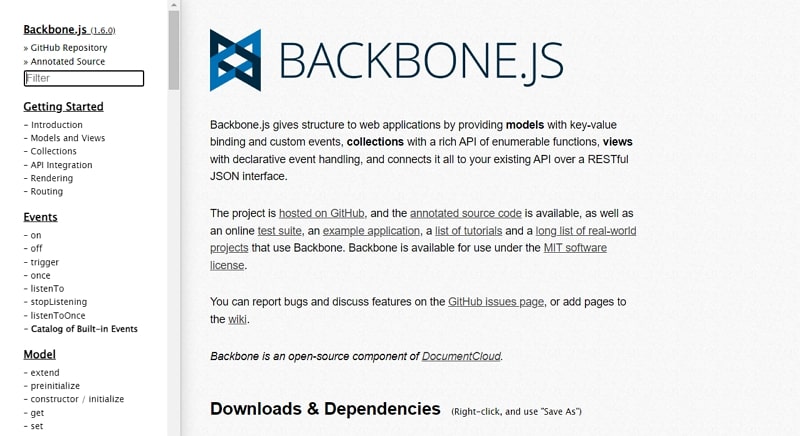
Backbone.js is a JavaScript framework with MVP architecture for web apps and Model View Control (MVC) design patterns. Additionally, it provides a synchronous communication layer to communicate with the application’s back-end service. This top JavaScript framework is designed for single-page applications, supporting components such as models, collections, events, and routers.
Pros
- It uses a minimalistic approach to provide an innovative and lightweight framework for building responsive online applications.
- Also, it encourages users to break down larger systems into smaller and reusable components to enhance modularity.
Con
- Backbone.js requires expertise in HTML, CSS, and JavaScript languages because of its basic approach, proving challenging for beginners.
10. NestJS
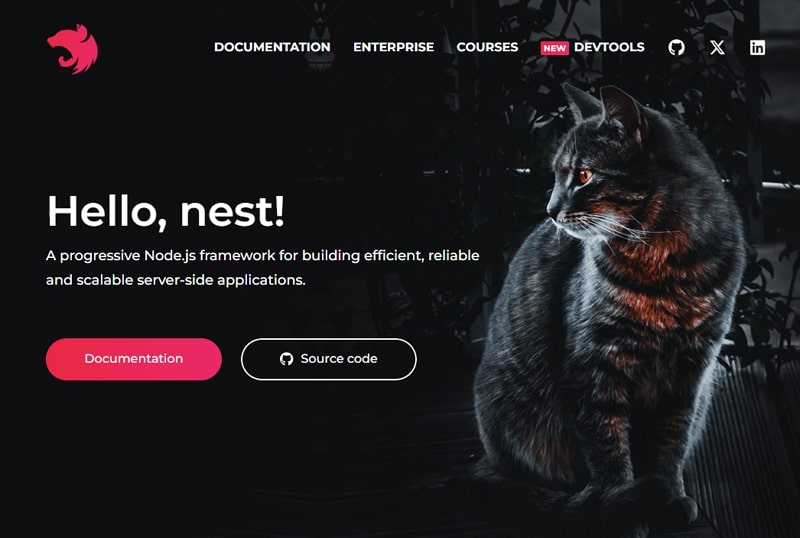
With an emphasis on modularity and TypeScript, this JavaScript framework builds scalable and enterprise-grade server-side applications. Additionally, it takes inspiration from Angular for Functional Reactive and combines elements of OOP, FP, and FRP to create a robust developing environment. It allows you to build testable, loosely coupled, scalable, and maintainable applications with exceptional architecture.
Pros
- NestJS is integrated with popular Node.js libraries and allows you to use third-party modules.
- Developers can also use TypeScript features in this framework, like interfaces, to provide abstraction and boost speed.
Con
- Compared with other JavaScript frameworks, it doesn’t have extensive resources and community.
Which is the Best JavaScript Framework?
JavaScript is a leading language for web development, but its frameworks have unique features, advantages, and disadvantages. Therefore, choosing the best JavaScript framework becomes challenging but important because you are investing yourself in the process. In this regard, React is considered the king of the JavaScript framework as it offers developers several advantages.
First, its codes are easier to maintain due to the modular structure, and it offers a virtual DOM program to make apps run faster. Secondly, deploying React is fairly easy and time-saving for developers due to its reusable components. You can also integrate other frameworks with React, such as Next.js, for full-stack web app development. Moreover, React supports multiple approaches for applications’ design structures, making it a preferable choice for developers.
Leveraging JavaScript Frameworks for Real-Time Communication with ZEGOCLOUD
If you intend to add communication features to your existing web applications, using a JavaScript framework like ZEGOCLOUD would be worthwhile. It offers easy-to-integrate video call APIs & SDKs and voice call APIs & SDKs, which eliminate the need to write codes from scratch when adding communication features in apps. Moreover, it provides more than 20 pre-built UIKits and 50+ components that create dynamic apps for any device.

Developers can generate revenue using this platform as it supports effortless development and testing of basic functions. Besides, its ready-made components can build a feature-rich communication experience with highly customizable SDKs. Plus, it offers voice and video call APIs with features like crystal-clear voice, group calls, AI noise reduction, and voice changer.
Conclusion
Let’s wrap up the discussion, as you are now familiar enough with the JavaScript framework, its types, and a list of the best frameworks of 2025. Hence, you can choose one framework that resonates with your project’s requirements, personal preferences, and learning curve. If you need an easy-to-integrate solution with low coding efforts, you should try ZEGOCLOUD for its extensive communication APIs.
Read more:
- 10 JavaScript Projects for Beginners with Source Code
- Java vs JavaScript: Difference between the Two Languages
FAQ
Q1: What are the frameworks of JavaScript?
JavaScript frameworks are tools used to build web applications with a clear structure. They help manage UI updates, handle application state, and organize code when projects grow beyond simple scripts.
Q2: What are the top 5 JavaScript frameworks?
The most commonly used JavaScript frameworks usually include options that focus on component-based development and efficient UI rendering. Their popularity is shaped by community usage, tooling support, and real-world adoption.
Q3: Why is everyone suddenly ditching JavaScript frameworks?
Some developers choose not to use frameworks when projects are small or requirements are simple. In these cases, using plain JavaScript or lightweight libraries can reduce setup time and make the code easier to understand and maintain.
Q4: What are the top 5 front end frameworks in 2026?
The top front-end frameworks in 2026 are those that are widely used in production and actively maintained. They are commonly chosen for building modern web interfaces and handling complex user interactions.
Let’s Build APP Together
Start building with real-time video, voice & chat SDK for apps today!









